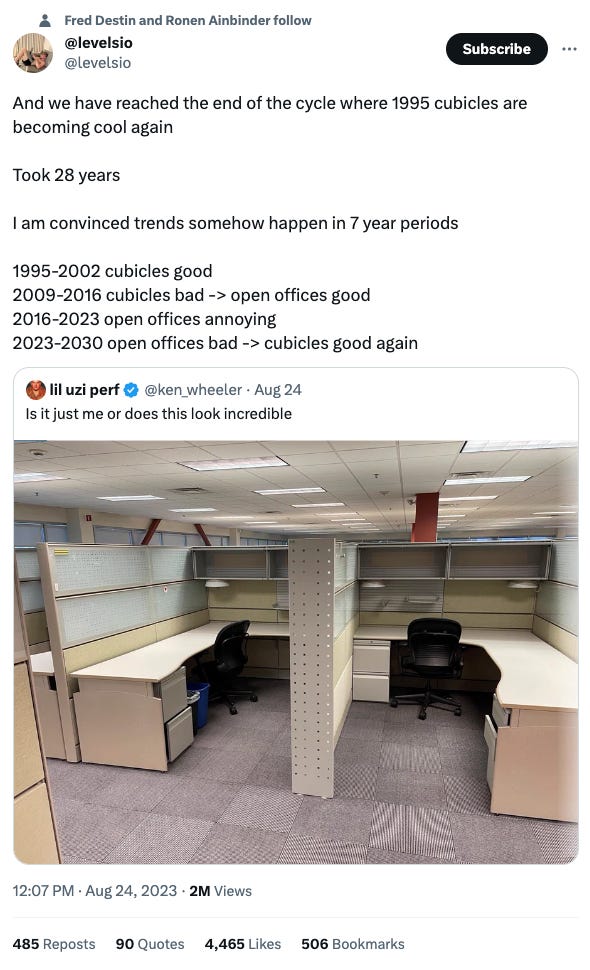Moneyball is a fortnightly newsletter from Koble exploring the limitations of human decision-making and their implications for startup investing.
We’ve spent two years developing our groundbreaking algorithms, which discover early-stage startups that outperform the market and predict their probability of success.
This week
🧠 Mental Model #22 – Preferential Attachment – The law behind the Power Law
📖 Investor reading – Are hedge fund pioneers facing the end of a golden era? – Venture capital funds are mostly just wasting their time and your money – Are we in a golden age for private market secondaries?
💬 Some tweets – Hedge Fund, Venture Capital, Private Equity – What's the most overused word in venture capital? – We have reached the end of the cycle where 1995 cubicles are becoming cool again
The law behind the Power Law
Venture Capitalists talk a lot about the Power Law.
Most investments (65% of companies) don’t work out but a few (4% of companies) can generate 10 to 50 times your money or more. And a very small number of investments (6%) drive aggregate fund returns (60%).
This much we know. But we rarely break down the underlying dynamics of the Power Law – how the fat-tailed distributions that define startup investing actually come about.
Enter the work of Albert-László Barabási and Réka Albert, who in 1999 explained numerically observed degree distributions on the web and coined the term “Preferential Attachment”. In short, new nodes or entities are more likely to attach themselves to existing nodes with higher degrees of connectivity.
On the World Wide Web, these nodes are websites like Google and Facebook with an exceptional number of links. In a metabolic network they are molecules like ATP or ADP, energy carriers involved in an exceptional number of chemical reactions.
This leads to a privileged position where early wins lead to further benefits that cumulatively add up to an outsized advantage. Sound familiar?!
Preferential Attachment might seem obscure, but it’s ubiquitous in our daily lives. Every time we use the internet, go to a football match, make a new acquaintance, scroll Instagram, watch a movie, or search for scientific papers on obscure topics like the emergence of scaling in random networks.
Preferential Attachment isn’t just a cornerstone of Network Theory. It’s the key to understanding how Venture Capital really works. Call it the law behind the Power Law.
The reality of life in the Venture-verse – for investors and startups – is that new nodes prefer to link to more connected nodes. This snowball effect (sometimes referred to as Cumulative Advantage or the Matthew Effect) means that startups with traction, funding, and media attention are more likely to attract further investment and resources than others.
Preferential Attachment also explains the prevalence of serial founders, who leverage their existing networks to raise capital for new projects. Serial founders attract 2.5x more participation from the top 100 investors compared with first-time founders, and they raise around 2.5x more in angel and seed rounds than first-time founders, increasing to 3.4x for early and late-stage rounds.
Preferential Attachment can even mitigate past failures (and scandals), as evidenced by Adam Neumann’s remarkable resurrection as a residential real estate guru. Less than 2 years after leaving WeWork in disgrace, he announced a new venture with $350 million in funding from leading VCs.
By the same token, investors with seasoned portfolios and large LP networks find it easier to raise new funds and gain access to high quality deaflow.
The rise of the “megafund” in recent years can be explained by Preferential Attachment. Capital is becoming increasingly concentrated into a few hundred funds globally, with the top 20 VC brands now managing more than $200 billion, which translates to 10% of total VC assets globally.
Implications for investors
Traction begets traction; investors beget investors; scale begets scale. This we know. But how can we practically benefit?
Michael Tefula has written far more eloquently than us on Preferential Attachment in startups. His advice?
“To benefit from preferential attachment, identify positive feedback loops in your field then look for ways to engineer them to your advantage [...]
If we internalise how power laws work, we become better placed to tilt the odds in our favour by working not just harder, but also smarter.”
Technology can help with this. At Koble we talk a lot about “re-engineering startup investing”. In practice this means using data science to better understand and monetise the underlying network effects that drive capital formation and value accrual in startups.
AI is ideally suited to deconstructing the Power Law – demystifying the miracle of Venture Capital.
Fully-fledged “Quant VC” (not to be confused with its safe-but-ineffectual cousin “data-driven investing”) enables VCs and angels to optimise their investments and fully benefit from Preferential Attachment – the hidden force at the heart of every startup portfolio.
Work with Koble
At Koble, we’ve spent two years developing our groundbreaking algorithms, which discover early-stage startups that outperform the market and predict their probability of success.
We’re working with forward-thinking angels, VCs, family offices, and hedge funds to re-engineer startup investing with AI. If that resonates, get in touch.
Investor reading
❓ Are hedge fund pioneers facing the end of a golden era? – The multi-manager model has generated years of exceptional returns, even after fees. But rising interest rates and an expensive battle for talent are taking their toll.
🤑 Venture capital funds are mostly just wasting their time and your money – Morgan Stanley equity strategists Edward Stanley and Matias Øvrum have run the numbers for the past 20 years of crossover investing and found that the average VC fund doesn’t reliably outperform the average stock.
💰 Are we in a golden age for private market secondaries? – In the wake of a significant market dislocation and against a challenged economic backdrop, the secondaries market has come to the fore as a key tool for investors seeking liquidity.
Some tweets
Parting shot
“A child has no trouble believing the unbelievable, nor does the genius or the madman. It’s only you and I, with our big brains and our tiny hearts, who doubt and overthink and hesitate.”
– Steven Pressfield
Regards from your [cumulative] startup investing AI,
About Koble
Koble is re-engineering startup investing with AI, applying quantitative strategies that have disrupted public markets to early-stage startup investing.







